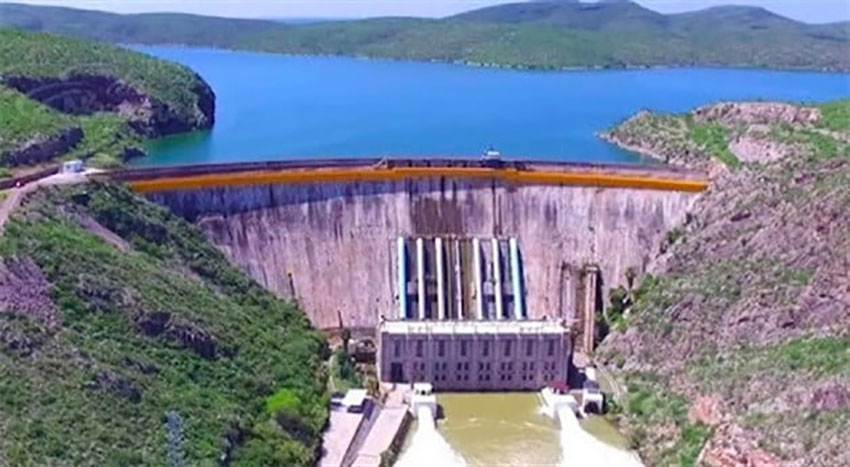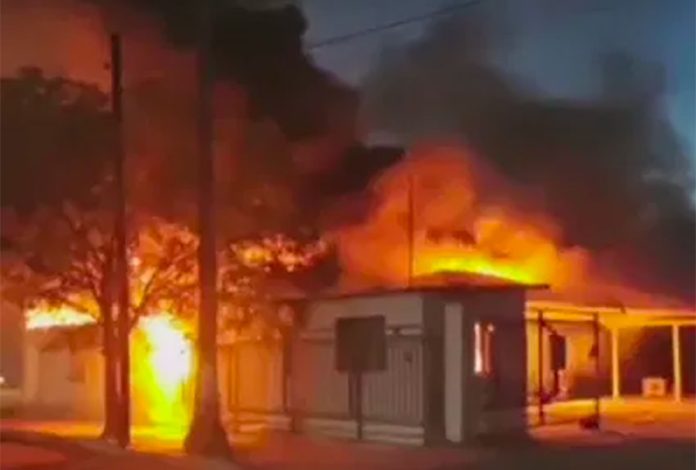A day after protests in Chihuahua against the payment of a “water debt” to the United States turned violent, a foreign affairs official revealed Thursday that the U.S. has contacted Mexico to ask it to comply with the 1944 bilateral water treaty.
Roberto Velasco, head of the Foreign Ministry’s North America department, told a press conference that farmers in the United States have pressured their government to lobby Mexico to deliver the water it owes to its northern neighbor.
Mexico has a massive water debt to the United States under the terms of the 1944 treaty, which the National Water Commission (Conagua) has been repaying by diverting water from dams in Chihuahua to the Rio Grande on the northern border for use by the United States.
Farmers in Chihuahua have staged several protests against the water diversion, arguing that they will be left with insufficient quantities.
Farmers north of the Rio Grande, Velasco said, are constantly saying to their government, “we want that water because we also want to irrigate our crops.”

Velasco said the government recently received correspondence from the U.S. section of the International Water and Boundary Commission (IBWC), an international body created by the U.S. and Mexico in 1889.
“They say Mexico has to take action now to comply with the [water treaty]. … They’ve said it in Washington, … they’ve said it publicly, they’ve sent us a diplomatic note as well,” Velasco said.
He said that Mexico wants to settle its debt with its neighbor and claimed there is enough water to do so while guaranteeing supply for farmers in Chihuahua.
Velasco said that if Mexico fails to settle its 2020 water debt, the United States could seek a renegotiation of the existing treaty.
That could lead to Mexico losing certain advantages built into the existing agreement such as flexibility about when water “payments” are made, he said.
Conagua chief Blanca Jiménez said that as of July 23, Mexico was late in diverting some 292 million cubic meters of water to the United States. She highlighted that water from dams in Nuevo León, Tamaulipas and Coahuila has already been sent north and asserted that there will be enough water in Chihuahua even after more water is diverted from the La Boquilla Dam, located on the Conchos River about 200 kilometers south of Chihuahua city.
Farmers in the northern state take a very different view and have protested at that dam as well as other locations, and clashed with authorities.
A protest on Wednesday against further water diversion from La Boquilla and other Chihuahua dams turned violent, with at least a dozen cars, toll booths and state and federal government offices set on fire in the state’s central-south region.
Chihuahua police arrested 17 people, including five minors, who allegedly started the blazes and committed other acts of vandalism, state authorities said. The police seized vehicles, baseball bats, Molotov cocktails and other weapons from those detained.
“In relation to the events that occurred … in Camargo, Saucillo and Delicias, there will be no tolerance for those people who participated in these acts of vandalism,” said Chihuahua Attorney General César Augusto Peniche Espejel.
Lawmakers with the National Action Party (PAN) claimed that the troublemakers were not farmers but rather people with links to the ruling Morena party who infiltrated the protest.
“There are people who are seeking to discredit their struggle,” a group of 16 Chihuahua and federal lawmakers said in a statement. “The farmers don’t know the people who caused the disturbances, … we demand that the Attorney General’s Office investigate … and punish these violent groups.”

The lawmakers also accused the federal government, in particular Conagua, of not understanding, nor wanting to understand, the water problems in Chihuahua, agricultural cycles and the needs of farmers.
In response, President López Obrador claimed at his morning press conference on Thursday that PAN politicians are in fact behind the protests, charging that they want to source water for their own business interests. He said his government is reviewing the management of water in the northern state, which is governed by a PAN governor, because he had information that water theft was occurring.
The president said that Mexico would comply with its obligation to send water to the United States but provided a guarantee that there would be sufficient water for both farmers and the general public in Chihuahua.
“We have to deliver water to the United States for a period; the agreement also allows us to have water, run-offs of water from the United States. …The opinion of technicians is that a renegotiation of this treaty wouldn’t be a good idea,” López Obrador said.
“We’ve had problems in Chihuahua because there is opposition to delivering water from dams in Chihuahua. I remind you that water belongs to the nation and is managed by the federal government in accordance with the constitution and laws. There has been resistance but we believe there is no reason for it. … Opposition politicians, in this case PAN politicians, are deceiving the people [saying] they’ll be left without water and that isn’t true.”
Source: Reforma (sp), El Universal (sp)
